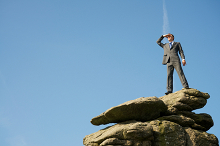Foresight reduces stress
Datum: 2014-12-01 10:18

Making a conscious effort to from time to time stop and skim through the calendar a month back and a month forward in time is an excellent way to achieve better foresight and enable us to anticipate our near future. I do this once every week.
As I look through the month that passed I remind myself of the meetings and other appointments I had and who I met. The purpose here is to recall things I promised others to do or get back to them with so that nothing is forgotten or neglected.
I then flip through the calendar and take a look at the month to come in order to get an overview of the deadlines which are approaching and to also get a feel for where I will be when (in terms of travels) and how I intend to get there.
Without structure “more to do” will equal “more stress”
I uttered this very statement during a lecture I held for twenty entrepreneurs in Ljusdal, Sweden, the other week. One of the participants looked distressed and said “Oh my, if I did that I would just become even more unstructured.”
“What do you mean?”, I asked him. “I would think of so many additional things I need to do that I would just end up feeling overwhelmed by stress. No, I think it’s better to just get on with things as they are”, he replied.
Thank you for that response. Why? Because it is the truth. If we stop at only reminding ourselves of all the things we promised others we would do and other things we need to get done sometime soon, but without actually doing something with this information, we are only filling our minds with even more “should do this”, “have to do that” and other “things we mustn’t forget”.
The stress increases and we will feel scattered and unfocused rather than calm and collected.
Channeled information is useful information
This is why it is absolutely crucial that we transfer what we come to think of out of our mind into a format there we can work with it, for instance by writing it down somewhere. The more structured we are when making note of what we need to do, the easier it will be to find information we need or proceed with the task in some other way.
Do this
If you want to, determine that you will practice the way in which you write down all those useful and important things you come to think of.
- As soon as you think of something you need to do or have promised someone else you would do, formulate it as a concrete and doable to-do-task on your to-do-list. Make sure that you only have one list (or two, if you wish to keep tasks concerning your private life separate) and that it is in a format which is sufficiently portable. It can just as well be written on a physical paper as in a digital app.
- As soon as you think of something which is not a to-do-task, but rather information which you do not know when you might need, write it down in a location where it will be easily accessible to you later on. Therefore, now take a moment to think about where you write this kind of information down today. You need to have a given place for every client, project, assignment, area of responsibility, supplier, employee, and even every contact person.
I recently met an acquaintance who told me that lately he has chosen to write down all his ideas, tips and other types of reference-information in a digital tool and this has resulted in that he moves from thought to action much sooner. All useful information he gathers is now easily available in a given and easily accessible location until the right moment arrives. - Let this be enough for now. Next Monday, think back on the week that passed. Have you been thinking and worrying less about if you have forgotten something than you usually do, and hence had more space and energy to focus on the task you are working with right now? Have you been less distracted and more focused? Hopefully your answer will be yes.
Immediately is wonderful
If you write down the things you come to think of as you skim through the calendar one month back and one forward immediately (and of course as well as when you think of things you need to do otherwise too) as to-do-tasks or reference-information, this method for greater foresight will feel liberating and relieving. You will go through the most recent past and your near future in order to be able to let go of them and instead be more focused on the task which requires your attention right now.
What is your way?
How do you ensure you have enough foresight? Feel free to write a comment and share your thoughts.




